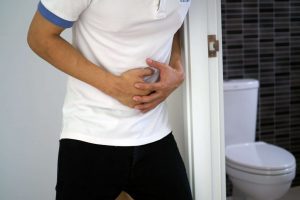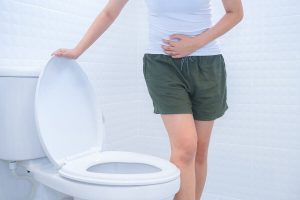Diarrhea is not an independent disease, but a symptom of many different diseases and disorders, from severe infections to stress. In addition to unpleasant sensations, diarrhea is associated with the danger of rapid dehydration. You will learn from our article about what diseases can be associated with frequent loose stools and what measures should be taken in case of sudden diarrhea.
What is diarrhea
In everyday life, we call diarrhea diarrhea. This is loose stools more often 3-4 times a day, accompanied by pain and bloating, pulling pains in the rectal area without defecation (tenesmus), sometimes nausea and vomiting. With diarrhea, the water content in feces rises to 60-90%, while their amount does not exceed the usual rate of 100-300 grams, their consistency simply changes.
Diarrhea occurs due to a violation of the absorption of water and electrolytes in the intestine. This symptom can manifest itself both with an infectious lesion of the body and the presence of foci of inflammation in the digestive organs, and with disorders of the nervous system.
Diarrhea causes
There are many reasons for sudden stomach upset, and it is not always possible to immediately determine what caused the diarrhea. The most frequent factor is infectious, in our country alone, more than 700 thousand cases of acute intestinal infection of an established and unknown etiology are recorded annually.
Among the main causes of diarrhea are:
Intestinal disorders that occur in the first weeks of staying in another country (traveler’s diarrhea). This is an infectious disease associated with the consumption of unfamiliar food, poor-quality water, etc. and accompanied by fever, abdominal pain, diarrhea and vomiting. It is more often observed when traveling to countries in Asia, Africa and Latin America.
Viral infection – Diarrhea often accompanies infection with rotavirus, norovirus, and several other agents.
The ingestion of bacteria, such as salmonella, provokes the development of bacterial gastroenteritis.
Parasitosis is the presence of worms and some protozoa in the intestines.
Food poisoning with stale food, alcohol, toxic substances.
The use of certain drugs: laxatives, antibiotics, antacids with magnesium, caffeine-containing drugs and some others.
Certain functional diseases, for example, irritable bowel syndrome, autoimmune disorders, nervous disorders.
Unhealthy diet – eating a lot of rough food of plant origin or too fatty foods.
Bowel diseases of inflammatory etiology – Crohn’s disease, ulcerative colitis.
Surgical removal of part of the intestine or stomach.
Malabsorption syndrome – intolerance to lactose and some other carbohydrates, pancreatic dysfunction, inability of the stomach to digest gluten (celiac disease).
Neoplasms in the stomach, colon and other parts of the digestive system.
Tumors of endocrine etiology – thyroid cancer and others.
Diseases of the endocrine system – hyperfunction of the thyroid gland, diabetes mellitus and others.
Stress – sometimes students before an important exam or impressionable people before a public speech experience discomfort in the intestines, which is commonly called “bear sickness.”
Infectious gastroenteritis, also known as food poisoning, or intestinal infection of unknown etiology, is a disease characterized by the sudden onset of diarrhea and / or vomiting. Most cases of acute gastroenteritis are associated with a viral infection, but some are caused by bacterial or protozoal infections. The illness usually resolves without treatment within a few days, but in severe cases, diarrhea can quickly cause life-threatening dehydration.
Quote from the book by Sergei Butriya “Modern parents: everything that dad and mom need to know about the health of a child from birth to 10 years old”
To establish the true cause of diarrhea can only be based on the results of a comprehensive examination.
Diarrhea treatment
Treatment tactics depend on the causes of the diarrhea. Priority measures are aimed at replenishing the body’s fluid reserves, for this purpose special saline solutions are prescribed for drinking, and in severe cases they are administered intravenously.
To stop diarrhea https://en.wikipedia.org/wiki/Diarrhea, medications are taken to slow down the movement of intestinal contents.
Diet is of great importance. During an upset stomach, you should completely abandon plant foods, dairy products, fatty fried meat, baking. It is best to limit yourself to sweet tea with crackers during the day.
How to relieve your condition at home?
An intestinal disorder most often goes away without any treatment, but this condition is very difficult to tolerate. Simple guidelines will help make it easier:
give up coffee and any alcohol, drink more plain water,
strengthen the stomach with rice and oat broth, rice porridge on water,
during diarrhea, you need to lie down calmly and avoid any physical activity,
you can take activated carbon or other sorbents.
If the diarrhea persists within a few days, you should seek medical attention.
